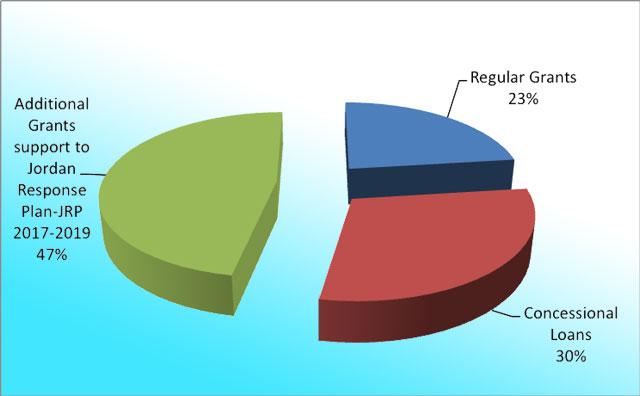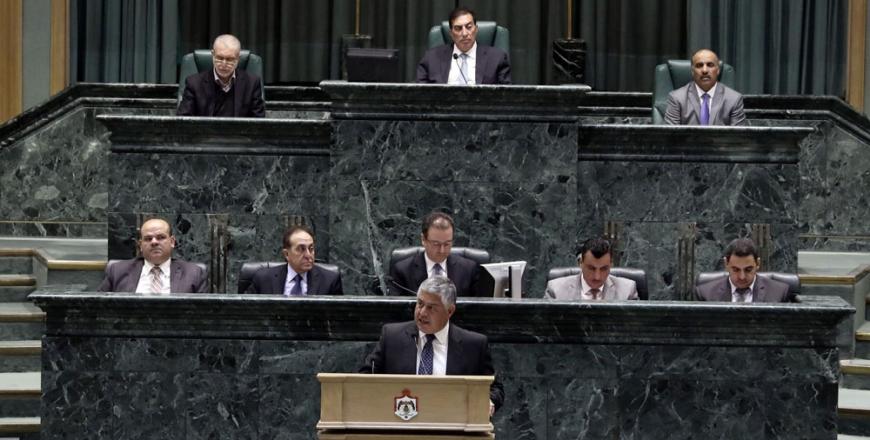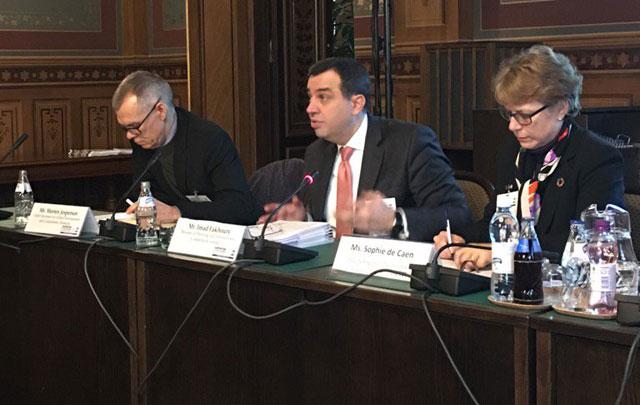You are here
King receives 2017 government performance report
By JT - Jun 20,2017 - Last updated at Jun 21,2017
AMMAN — His Majesty King Abdullah on Monday received a report from Prime Minister Hani Mulki summarising the government's achievements over the year, according to a Royal Court statement.
The report was divided into eight sections: economic reform, administrative reform, combating corruption, improving the judiciary, education and human resources, employment and labour, protection and social development, and the services sector.
In the report, Mulki said that the economic reform was the most significant challenge his [second] government faced in its first year, highlighting the “untraditional” decisions his government took to boost stability and maintain balance in national economy through a set of carefully studied decisions and measures.
The government's vision was based on three pillars, he said: reducing spending, increasing growth rates and revenues through addressing taxation issues by amending tax tariffs and exemptions, with a special focus on removing subsidies of non-basic commodities of no interest to poor-and middle-income households.
The government's decisions focused on serving the interests of low-and middle-income segments, including the cancellation of tax hikes that would have affected 93 commodities consumed by these groups of society, Mulki said in the report, adding that the minimum wage was also increased by JD30.
These measures also contributed to setting fixed prices at the civil and military consumer corporations, where the consumers’ satisfaction rate increased from 77 per cent in 2015 to 93 per cent in 2016.
During the first third of 2017, the prices of 81 per cent of commodities went down, following measures taken by the Industry, Trade and Supply Ministry and the continuous coordination with the concerned parties in the private sector.
The government also updated the industrial policy for 2017-2021, prepared a foreign trade policy for the same period and continued the construction of industrial estates in four governorates: Jerash, Salt, Madaba and Tafileh.
In the report, the premier highlighted several initiatives launched to stimulate the business environment as well as the government’s funding to various projects.
In light of the “effective spending control measures” during the first quarter of 2017, the government last week took additional measures to reduce spending by JD206 million, the report noted, adding that operational costs for ministries and government departments were tightly controlled and that the allowance for travel had been reduced by 50 per cent, limiting officials’ trips to the economy class only.
Moreover, no allocations were made in 2017’s state budget to buy cars or furniture for the ministries and departments.
On foreign grants and aid, the government launched an updated version of the Jordan Response Plan (JRP) to the Syrian crisis for 2017-2019, adopting it as a reference to determine its needs in limiting the burdens of hosting refugees, assisting host communities, and supporting the Treasury.
The JRP received around $191.2 million since the start of this year until the end of May, while total foreign aid to the Kingdom reached around $457.866 million by April 30, according to the report.
The government updated its governorate development programme for 2017-2019, based on a decentralised approach that aims at boosting popular participation, the report said, highlighting the programmes aimed at developing the northern, central and southern Badia areas, considered as remote areas with development challenges and high poverty and unemployment rates.
In the energy sector, the government worked on increasing its use of renewable energy sources and operated the first phase of 12 solar energy projects, with a total generation capacity of 200 megwatts.
The government also started implementing a project to generate electricity from oil shale, a long-awaited project expected to begin production during the first quarter of 2020, the report said, adding that the government divided petroleum areas in the Kingdom on a practical basis of 10 discovery areas and two development areas, in a bid to promote all of them.
In the first quarter of 2017, the Kingdom observed stability regarding public debt to gross domestic product (GDP) ratio, (see separate story) which stood at 95 per cent in spite of rapid increases in previous years, the report said, adding that deficit after grants decreased to 3.2 per cent at the end of 2016 and is expected to keep decreasing to around 2.5 per cent by the end of 2017.
Economic reforms led to an increase in revenues as exports and reexports increased by 8.4 per cent, expatriate remittances by 3.3 per cent and tourism income by 18 per cent since December 2016 until April of this year.
The report indicated that the government fixed issues regarding salaries of high-position employees through reducing the salaries of 136 employees and increasing the low income of 67 employees. It also amended the civil services by-law to boost the performance of public servants and root the principle of law sovereignty in public administration.
The report included a detailed description of measures taken by the government to face issues in various sectors including the environment, tourism, economy and industry, in addition to its efforts to host large-scale events like the Arab summit.
Related Articles
AMMAN — The total foreign aid contracted by donors to Jordan in 2017 reached $3.65 billion, compared with $3.15 billion in 2016, a Planning
AMMAN — The Lower House on Wednesday listened to the state budget draft law speech delivered by Finance Minister Omar Malhas, the Jordan New
AMMAN — Planning and International Cooperation Minister Imad Fakhoury has participated in an international conference in Helsinki to discuss



















